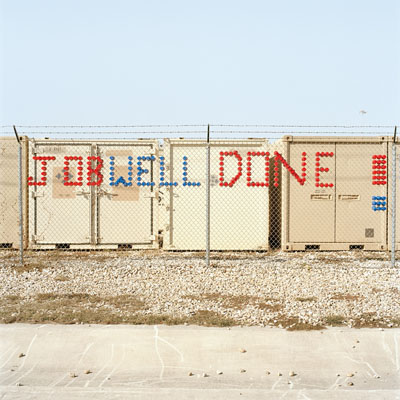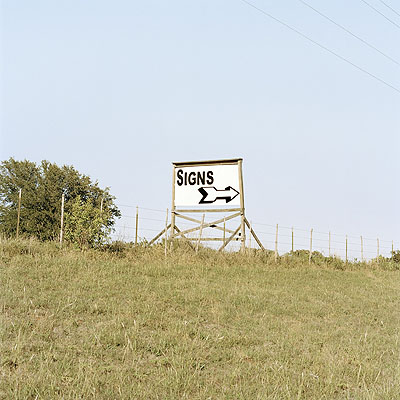
'Job Well Done', 2006, 100x100cm, Edition of 5
Peter Granser »
SIGNS I
Exhibition: 15 Sep – 11 Oct 2007
Kaune, Sudendorf
Albertusstr. 26
50667 Köln
Kaune Contemporary
Gereonskloster 12 (Kapelle)
50670 Köln
+49 (0)221-278 578 14
info@gallery-kps.com
www.kaunegallery.com
Tue, Wed 10-15; Thu,Fri 10-18; Sat 12-17

The arrow provides orientation, unmistakably pointing toward the right: it is displayed on a billboard in the midst of steppe-like scenery, with large lettering announcing 'Signs.' This is a picture within a picture, rife with symbolic content, for Peter Granser has chosen to give this title to his latest series of photographs, taken in 2006/07 in Texas. In the course of an extended photographic tour of the US state, Granser attempted to find reference values that could be captured in images capable of laying bare the current state of the American soul. On the heels of 'Sun City' and 'Coney Island,' the photographer's third series, 'Signs', draws a telling picture of life today in the USA. Granser traveled over 19,000 kilometers through the cliché-ridden, myth-laden "republic" of Texas in the US south, through a state that is twice the size of Germany and which has always been written off as eccentric, reactionary and excessive. Today, however, Texas has become the heartland of a fundamentalist, conservative ethos that is paradigmatically embodied by the perpetuation of the death sentence and the politics of the Bush administration. Job well done With keen and objective precision, Peter Granser focuses in his color photographs on the plethora of relics and signs that proliferate across the landscape and provide us with insights into the strange and contradictory state of contemporary US identity. In a conference room at the Fort Hood military base, the US Army's biggest boot camp back in the days of the Cold War, two clocks indicate the time in the USA and in Iraq. The whiteboard beneath them is empty, except for a doodle of a little girl in the corner, smiling. Plastic cups pressed into the holes of a fence in front of supply containers spell out a welcome home for soldiers returning from Iraq. JOB WELL DONE is the message, in the colors of the American flag. A flag also adorns the legendary NASA moon rocket Saturn V in Houston, but it is covered by a clear plastic tarp. Oil derricks, traditional symbol of the wealth of the Texan oil magnates, survive in Midland only as silhouettes lined up on a mural decorating the side of a high rise. A mass religious event in America's biggest megachurch, composed by Granser in the form of a monumental triptych, is staged as a faceless place where the human individual no longer has any value. Salvation takes precedence. Emptiness and stagnation dominate the atmosphere in this photo series resonant with skepticism, which in its formal qualities and motifs deliberately makes reference to the work of various American documentary photographers (Walker Evans, William Eggleston, Henry Wessel). 'Signs' adds a new chapter to this legacy, depicting present-day Texas as an intellectually ossified realm where rigorous puritanical devoutness mixes with capitalist and patriotic interests to create a menacing brew.
You may all go to Hell, and I will go to Texas.
David Crockett, Politiker (1786-1836)
Der Pfeil gibt die Richtung vor, unmissverständlich zeigt er nach rechts: Inmitten einer steppenartigen Szenerie auf einem Billboard platziert, das in Großschrift auf 'Signs' hinweist. Es handelt sich um ein Bild im Bild mit Symbolgehalt, denn programmatisch hat Peter Granser seiner jüngsten Werkserie, die 2006/07 in Texas entstanden ist, den Titel 'Signs' gegeben. Bei seiner ausgedehnten photographischen Erkundung des US-Bundesstaates galt es, visuell fassbare Bezugsgrößen ausfindig zu machen, den aktuellen Seelenzustand Amerikas offen zu legen.
Nach 'Sun City' und 'Coney Island' bildet 'Signs' die dritte Werkgruppe des Photographen, die ein signifikantes Gegenwartsbild der USA entwirft. Mehr als 19.000 Kilometer reiste Granser durch die klischee- und mythenbeladene Republik im Süden der Vereinigten Staaten, durch ein Land, das doppelt so groß wie Deutschland ist und seit jeher als exzentrisch, reaktionär und maßlos beurteilt wird. Zugleich gilt Texas als Kernland einer fundamentalistisch-konservativen Gesinnung, wie sie die Beibehaltung der Todesstrafe und die Politik der Bush-Administration gegenwärtig paradigmatisch verkörpern.
Job well done
Mit distanzierter Präzision fokussiert Peter Granser in seinen Farbphotographien die zahlreichen Relikte und Zeichen, die über den widersprüchlichen wie sonderlichen Zustand US-amerikanischer Identität Aufschluss geben. In einem Besprechungsraum der Militärbasis Fort Hood, zur Zeit des Kalten Krieges das größte Ausbildungslager der US Army, geben zwei Wanduhren die US-amerikanische und die irakische Realzeit an. Das Flip Chart darunter ist leer, allein in der unteren Ecke ist in kindlicher Manier ein Mädchen gezeichnet, es lächelt. Plastikbecher, die vor Versorgungscontainern in einen Zaun eingedrückt worden sind, heißen die Zurückgekehrten des Irakkrieges willkommen. JOB WELL DONE verkünden sie in Landesfarben. Eine Nationalflagge, die die legendäre NASA Mondrakete Saturn V in Houston schmückt, ist zur Renovierung in Klarsichtfolie eingepackt. Bohrtürme, tradierte Symbole für den Reichtum texanischer Ölmagnaten, überdauern in Midland lediglich als Silhouette aneinandergereiht auf einer Hochhauswand. Eine religiöse Massenveranstaltung in Amerikas größeter Megachurch, die Peter Granser als monumentales Triptychon komponiert, inszeniert sich als gesichtslose Stätte, in dem dem menschlichen Individuum keinen Wert mehr beigemessen wird. Das Seelenheil wiegt mehr.
Leere und Stagnation bilden die atmosphärischen Dominanten der von Skepsis geprägten Bildserie, die in ihrer formalen und motivischen Umsetzung bewusst Referenzen zu einzelnen Positionen der US-amerikanischen Dokumentarphotographie (Walker Evans, William Eggleston, Henry Wessel) bereithält. Konsequenterweise charakterisiert 'Signs' die texanische Gegenwart als ein geistig erstarrtes Areal, in dem sich eine streng puritanische Gläubigkeit mit kapitalistischem und den nationalpatriotischen Interessen zu einem bedrohlichen Amalgam vermischt hat.